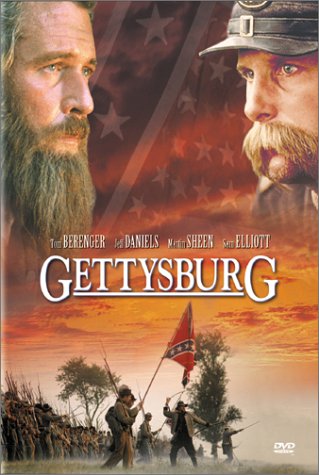Sometimes, it’s not the Big Bad the heroes are fighting against, so much as an almost friendly opponent who is not so different from them after all. That’s what this trope is all about.
The Worthy Opponent is no mere redshirt or mook–quite often, in fact, he’s the Dragon of the opposing side–but unlike the Big Bad or the Evil Chancellor, he won’t stab his enemies in the back or willfully break the rules of war. He keeps his word, fights like a gentleman, and may even have a soft spot for the hero. He’ll duel to the death, but will hand the hero back his sword rather than hit him when he’s down. If he’s in a position of command, he’ll most likely be a father to his men, and sorely regret the loss of life that he is forced to oversee. When defeated, it’s not unusual to hear him say that it has been an honor.
 This trope has been on my mind recently because I’ve been on something of a Civil War trip, watching and rewatching the movie Gettysburg. It’s a fascinating movie, not the least because there are no clear bad guys. In the battle of ideologies, I side solidly with the Union, but in the battle of men, I don’t know who to side for.
This trope has been on my mind recently because I’ve been on something of a Civil War trip, watching and rewatching the movie Gettysburg. It’s a fascinating movie, not the least because there are no clear bad guys. In the battle of ideologies, I side solidly with the Union, but in the battle of men, I don’t know who to side for.
General Lee is one of my favorite characters, and certainly the commander for whom I have the most respect. When General Longstreet is forced to order his men on the suicidal charge on the third day, I can’t help but cringe. And perhaps the most touching moment of the whole movie is when the wounded General Armistead asks to see his old friend, General Hancock, only to learn that he has been shot as well:
BG Armistead: I would like … to see General Hancock. Can you tell me … where General Hancock may be found?
Lt. Chamberlain: I’m sorry, sir. The general’s down, he’s been hit.
BG Armistead: No! Not … both of us! Not … all of us! Please, God!
The main appeal to me of this movie, and in a more general sense of this entire trope, is the roll that honor plays in the characters’ interactions with each other. Yes, they may be bitter enemies, and they may not hesitate to kill each other, but they aren’t fighting because they hate each other–they’re fighting because honor demands it. And just like how the Fettered gains great strength through strict obedience to his personal code, so too does the Worthy Opponent gain both strength and respect by being a man of honor.
Obviously, this sort of antagonist makes it almost impossible to tell a story with black and white morality. But with this trope, that’s kind of the point. It exists to tell us that the enemy is not so different from us, and that not every bad guy is completely evil. It doesn’t have to be used to set up an Aesop, though–when done well (as it was in Gettysburg), it’s satisfying enough on its own.
I played a lot with this trope in Stars of Blood and Glory. In that book, Abaqa, a young Hameji warrior trying to build a name for himself, falls prisoner to Danica and her band of Tajji mercenaries, who he has been taught all his life to hate. Gradually, though, they come to respect each other, to the point where … well, I won’t spoil it for you. But it was definitely fun to write. 😀
I haven’t played a lot with this trope yet in other stories, but I definitely hope to in the future. I’ve got another novel I’d like to write from Danica’s point of view, sort of a prequel novel to explore her and Roman’s origins, as well as the other Tajji mercenaries. And then there’s Heart of the Nebula, which needs a major rewrite but has some elements of this trope in it. So yeah, you can definitely expect to see more of this sort of thing from me in the future.